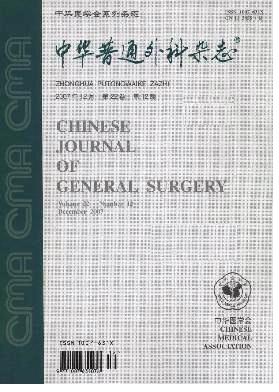LncRNA C21orF96 promotes the invasion and metastasis of gastric cancer by regulating the expression of miR-875-5p and USF2 genes
引用次数: 1
Abstract
Objective To verify that lncRNA-C21orF96 regulates the expression of miRNA-875-5p and USF2 genes and promotes the invasion and metastasis of gastric cancer. Methods RT-PCR was used to measure the expression of lncRNA-C21orF96 related miRNA in gastric cancer cells. pcDNA3. 1 plasmid was used to over-express lncRNA-C21orF96 in KATO-Ⅲ and siRNA was used to knockdown the expression of lncRNA-C21orF96 in SGC-7901, and RT-PCR was used to measure the expression of miRNA-875-5p and USF2 genes; By overexpressing lncRNA-C21orF96 in MKN45, transwell was used to observe changes of cells invasion and migration. Results LncRNA-C21orF96 showed a significant inverse relationship with miR-875-5p, (SGC-7901: 21.19 ±1.09 vs. 3.28 ±0.06, P<0.01; SNU-16: 24.76±2.09 vs. 8.16 ±0.07, P<0.01). In KATO-Ⅲ over-expressing lncRNA-C21orF96, miR-875-5p expression decreased significantly while USF2 expression increased (P<0.01); In SGC-7901 with lncRNA-C21orF96 knockdown, miR-875-5p expression increased significantly while USF2 expression decreased (P<0.05). The number of cells passing through the artificial basement membrane in the experimental group was significantly different from that in the control group (migration: 216.19 ± 2.30 vs. 89.19 ± 4.60, P<0.001; invasion: 146.18 ±5.3 vs. 59.18 ± 2.60, P<0.001). Conclusions The overexpression of lncRNA- C21orF96 significantly reduces the expression of miR-875-5p and promotes the expression of USF2, hence promoting the invasion and metastasis of gastric cancer. Key words: Stomach neoplasms; Gene expression regulation; Neoplasm metastasis; Neoplasm invasivenessLncRNA C21orF96通过调节miR-875-5p和USF2基因的表达促进癌症侵袭转移
目的验证lncRNA-C21或F96对miRNA-875-5p和USF2基因表达的调节作用,并促进癌症侵袭转移。方法采用RT-PCR方法检测lncRNA-C21或F96相关miRNA在癌症细胞中的表达。用pcDNA3.1质粒在KATO-Ⅲ中过表达lncRNA-C21orF96,用siRNA敲低SGC-7901中lncRNA-C 21 orF96的表达,用RT-PCR检测miRNA-875-5p和USF2基因的表达;通过在MKN45中过表达lncRNA-C21或F96,transwell用于观察细胞侵袭和迁移的变化。结果LncRNA-C21orF96与miR-875-5p呈显著负相关(SGC-7901:21.19±1.09 vs.3.28±0.06,P<0.01;SNU-16:24.76±2.09 vs.8.16±0.07,P<0.01);在lncRNA-C21或F96敲低的SGC-7901中,miR-875-5p表达显著增加,而USF2表达降低(P<0.05)。实验组通过人工基底膜的细胞数与对照组有显著差异(迁移:216.19±2.30 vs.89.19±4.60,P<0.001;侵袭:146.18±5.3 vs.59.18±2.60,P=0.001)C21orF96显著降低miR-875-5p的表达并促进USF2的表达,从而促进癌症的侵袭和转移。关键词:胃肿瘤;基因表达调控;肿瘤转移;肿瘤侵袭性
本文章由计算机程序翻译,如有差异,请以英文原文为准。
求助全文
约1分钟内获得全文
求助全文

 求助内容:
求助内容: 应助结果提醒方式:
应助结果提醒方式:


